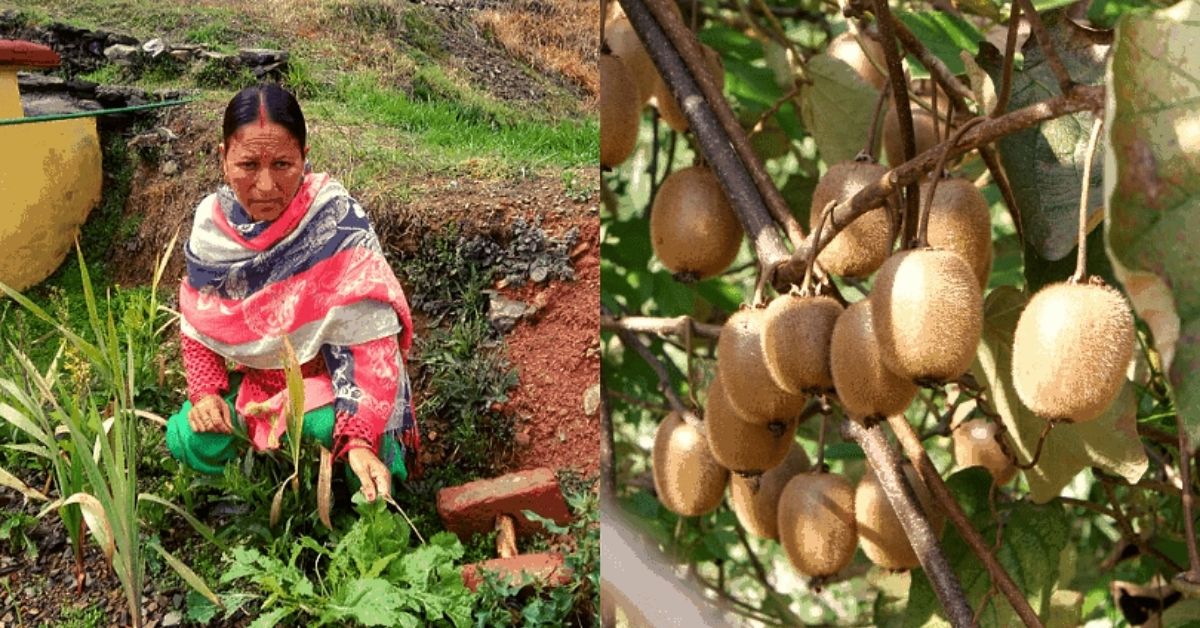Defying Disapproval, Tehri’s Kiwi Queen Reaps Sweet Success With Innovative Farming
Sita Devi, known as the 'Kiwi Queen' of Tehri in Uttarakhand, challenged the notions of traditional farming to reap bountiful harvests of the fruit.

Sita Devi of Tehri District in Uttarakhand, is a prime example of the sheer grit and perseverance with which women of the hills safeguard their land and livelihood in the mountains. Having faced failure, disapproval and doubt, she stands proud today as the “Kiwi Queen” of her land.
Sita and her family’s primary sustenance has always been agriculture. Until 2018, they grew traditional crops like ragi, millets, potatoes and peas. However, characteristic of mountain life, the family crop would more often than be ruined by monkeys and wild animals. This often left Sita dejected, so much so that she even considered giving up farming altogether.
An aleatory conversation among local Self Help Group (SHG) members of her Duvakoti village introduced her to the idea of growing kiwis. This highly nutritious fruit is grown in the steep hilly terrain that experiences 700-800 chilling hours. To boost kiwi production, the National Horticulture Board was offering financial assistance to farmers to cultivate, store, pack and sell the fruit on their lands.
“Believe it or not, I have come to experience that monkeys don’t even come near this fruit,” Sita excitedly shares.
A Journey of Perseverance
As brilliant as the idea was, in the beginning she faced major ridicule from local villagers for trying it. Kiwi, being an exotic fruit, was not so easily accepted as a means of earning a livelihood.
Nevertheless, Sita saw potential in the option and decided to go ahead with it. Defying local norms of traditional farming, she immediately contacted the Horticulture Department and got enrolled into the training programme offered under their scheme. The courageous move took this determined farmer miles away to the town of Solan in Himachal Pradesh but Sita says that it was all worth it.
The programme taught her the entire process of how to sow, water, harvest and monetise on the kiwi crop. Sharing her knowledge, she says, “Each plant has to be planted two to four meters apart, as the trees grow enormous in size. Regular but measured irrigation is integral in harvesting a good yield, but beyond that there is no need for extra fertilisers or equipment.”
She adds, “I like to sprinkle the land with a little organic cow dung every now and then to add some extra nutrients to the crop.” Later, the Horticulture Department also installed a drip irrigation system on her land, which completes the watering of plants within two hours while also saving water.
Soon her relentless efforts paid off. The first harvest bore a whopping 40 kg of fruit. While some of it would be enjoyed among friends and family, the remaining 30 kg fetched her an income of Rs 15,000 from the local markets of Tehri alone.
Today, she has 33 kiwi trees spread across a land of 2 nali (0.98 acres). The crop was affected by hail storms this year, leaving only four trees with flowers to bear fruits.
“If cared for in the right way, growing kiwis is a wholesome job in itself. It feeds my family with sweetness and sustains our living needs amply. If not this season, the trees will bear fruit the next season and help me cover up through trade within the vicinity of local markets,” she asserts.
The Road to ‘Queenhood’
Once Sita’s crop started yielding benefits, the skeptics around her changed their perception as well. Soon many farmers of her village began receiving seeds for planting kiwi from the horticulture department.
Of the 45 farmers who began cultivation, only her plants survived.
She attributes this success to her personalised care of the crop. “The plant yields high benefits but requires systematic cutting of the stems. Most people enjoy reaping the returns but are not consistent enough in putting the efforts required to tend to fruits,” she says. Sita would tend to the crop almost like caring for her children. Maybe this is why when the villagers started calling her the “Kiwi Queen”, it was not only apt, but also justified.
Sita says that hardships have no consequence in sustaining one’s livelihood. “It is important to not give up and find what works for you within the means available.”
She married early and had to drop out of school. Her husband, with whom she has two sons, works as a driver.
However, despite the obvious responsibilities that come with being a mother, a wife and a woman, she devoted her life to ensuring that her land was taken care of. Reaching beyond the confines of personal sustenance, Sita says her name has become synonymous with dignity throughout the district of Tehri.
Edited by Yoshita Rao
This story made me
- 97
- 121
- 89
- 167
Tell Us More
We bring stories straight from the heart of India, to inspire millions and create a wave of impact. Our positive movement is growing bigger everyday, and we would love for you to join it.
Please contribute whatever you can, every little penny helps our team in bringing you more stories that support dreams and spread hope.



















